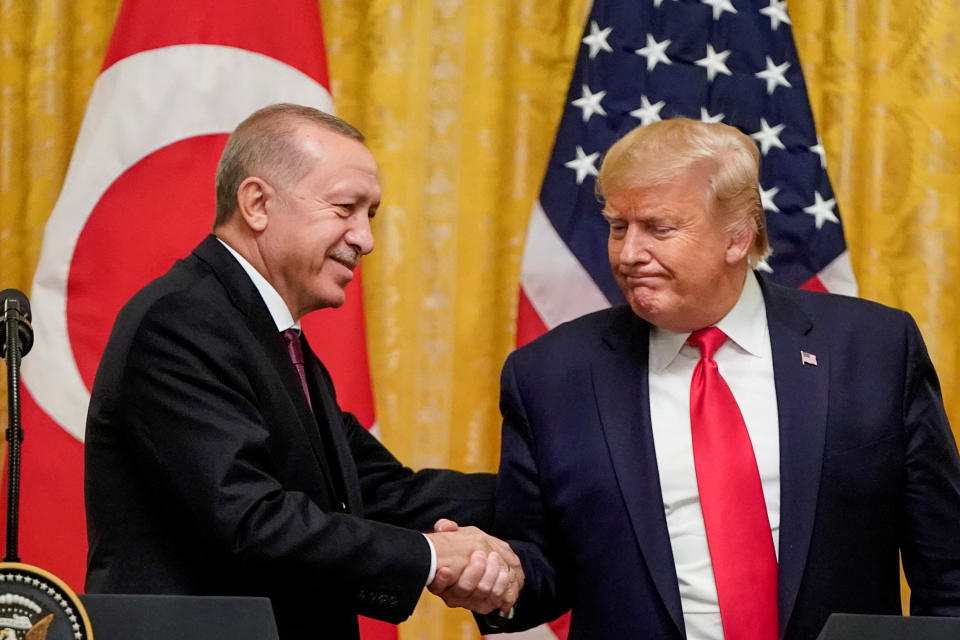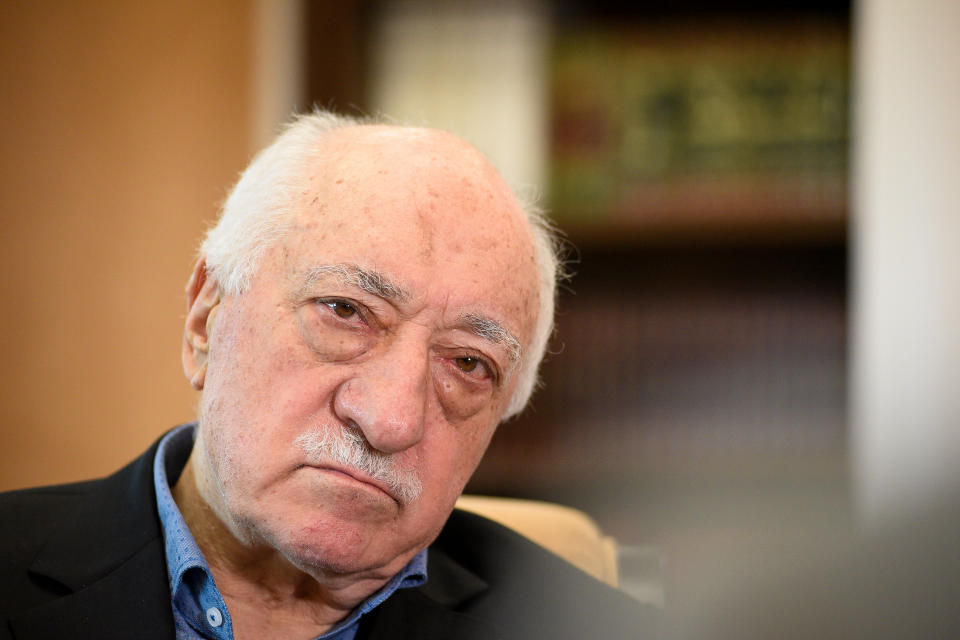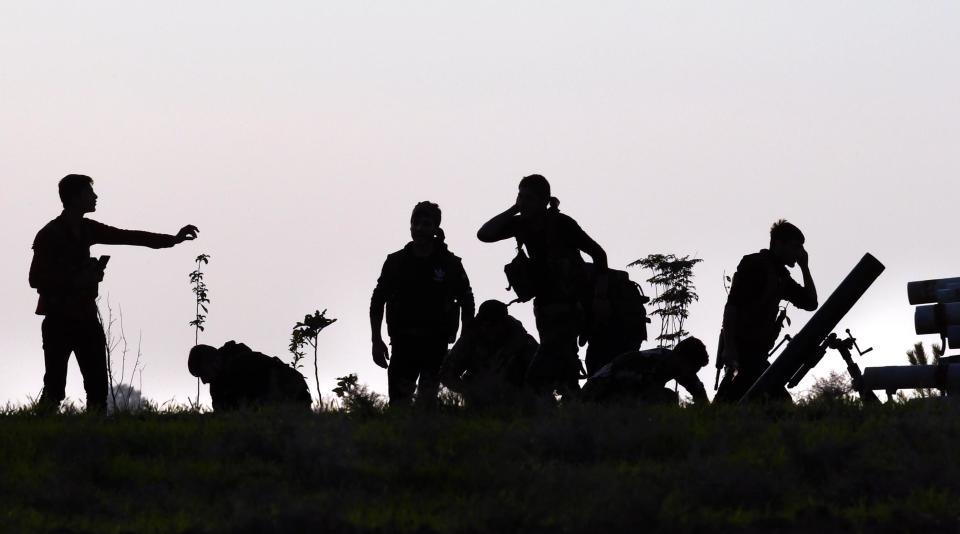'Only for the oil': Amid tensions over Syria, Trump says he's a 'big fan' of Turkey's Erdogan
WASHINGTON — Just hours before appearing at a joint press conference with his Turkish counterpart, and as the fate of his presidency was being debated over impeachment hearings on Capitol Hill, Donald Trump repeated his claims that the U.S. was staying in Syria to control oil fields, an assertion that appeared to be out of sync with what others in his administration have been saying.
Speaking to reporters earlier in the day in the Oval Office, Trump returned to a theme he has adopted in recent weeks, and in the process gave the impression that seizing Syria’s oil reserves was his main priority in that country.

“We’re keeping the oil,” he told reporters as Turkish President Recep Tayyip Erdogan sat beside him. “We have the oil. The oil is secure. We left troops behind only for the oil.”
Previously, others in the U.S. government have tried to portray Trump’s obsession with holding the Syrian oil fields as part of the campaign against the Islamic State group.
“The mission is the defeat of ISIS,” said Rear Adm. William Byrne, vice director of the Joint Staff, at a Pentagon press conference Nov. 7. “The securing of the oil fields is a subordinate task to that mission.”
Yet Trump’s remarks reflected a common theme that came up as he and Erdogan spoke to the press later in the afternoon: Despite yawning gaps in policy between the United States and Turkey, the U.S. president has sought to support Erdogan.

Trump began the press conference by thanking Erdogan for releasing Serkan Golge, a NASA scientist who was arrested in Turkey in 2016 in the aftermath of a failed coup. Convicted of membership in a terrorist organization in February 2018 and sentenced to five years in prison, Golge was released in May 2019 but banned from leaving Turkey.
“He’ll be coming back at some point in the not-too-distant future,” said Trump, who described Erdogan’s gesture as “a very nice tribute.”
Otherwise, the two leaders extolled their friendship and mutual admiration — Trump described himself as a “big fan” of Erdogan’s — but announced no breakthroughs on the range of issues that divide their governments.
Erdogan’s visit occurred at a time of increased tension between the United States and Turkey. The U.S. decision to ally with Kurdish militias in Iraq and Syria in its fight against the Islamic State group has infuriated Turkey, which regards the militias, especially the YPG in Syria, as terrorists linked to the Kurdistan Workers’ Party, or PKK, in Turkey, which both it and the United States consider to be a terrorist group. Last month Turkey invaded Syria to attack the YPG-led Syrian Democratic Forces and clear them from a 20-mile-wide zone along Turkey’s border with Syria, a move that prompted fierce criticism from members of Congress and accusations of war crimes.
Erdogan’s government was also upset by the House of Representatives’ landslide passage on Oct. 29 of a resolution recognizing the deaths of an estimated 1.5 million Armenians in the Ottoman Empire in 1915 as genocide. The resolution’s passage “hurt deeply the Turkish nation and [has] the potential of casting a deep shadow over our bilateral relations,” Erdogan said, adding that he expected the Senate to “take the United States out of the vicious cycle” started by the House resolution.

The fact that Fethullah Gulen, a Turkish Muslim cleric whose followers staged an attempted coup against Erdogan in 2016, continues to live in exile in Pennsylvania is another source of irritation for the Turkish government. “This is unacceptable,” Erdogan said.
Meanwhile, the United States has been unnerved by Turkey’s decision to buy the S-400 air defense missile system, which is incompatible with U.S. and other NATO systems, and which some experts believe might compromise the F-35 jet used by the United States and several of its allies.
Turkey’s acquisition of the S-400 “creates some very serious challenges for us,” Trump said. “Hopefully we’ll be able to resolve that situation.”
Trump has consistently expressed more sympathy for Turkish positions than even many Republicans in Congress, who opposed Turkey’s invasion of Syria and Trump’s decision to withdraw U.S. troops from that country (a move that has turned into more of a realignment of U.S. forces there).
In brief comments to reporters during an appearance in the Oval Office earlier on Wednesday, Trump went out of his way to praise Erdogan. “I want to thank the president for the job they’ve done,” Trump said in an apparent reference to Turkey’s actions in Syria.
In the run-up to the meeting of the two presidents, Trump administration officials and others were keen to play down the tensions between the two countries, while acknowledging that, as a senior administration official told reporters on a conference call the day before the visit, “there are irritants on both sides.”

Another senior administration official on the same call appeared to contradict Trump’s insistence on securing oil as a priority. The president’s priorities for northeastern Syria were to prevent a resurgence of the Islamic State and “to prevent humanitarian atrocities against religious and ethnic minorities,” said the official, citing Christians, Yazidis and Kurds as examples.
Turkey is “a key ally” and its “cooperation is critical for protecting U.S. interests in the region and beyond,” the first senior administration official told reporters. “This is nearly a 70-year alliance and has helped both of our countries through very, very dark times. We are not going to throw it away lightly if there is a way forward.”
In a breakfast meeting with defense reporters in Washington on Wednesday, British Air Chief Marshal Sir Stuart Peach, chairman of NATO’s military committee, also stressed Turkey’s importance to the alliance. “Turkey has been an important member of the alliance since the mid-1950s,” he said. “That situation has not changed. The geostrategic reasons for Turkey’s membership have not changed.”
_____
Download the Yahoo News app to customize your experience.
Read more from Yahoo News:



